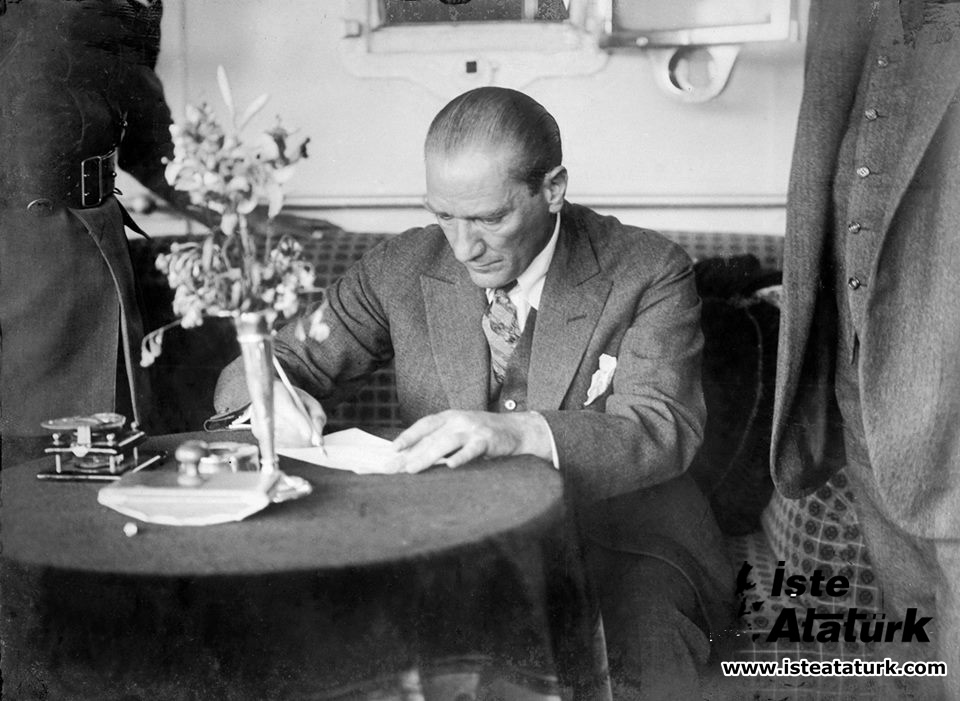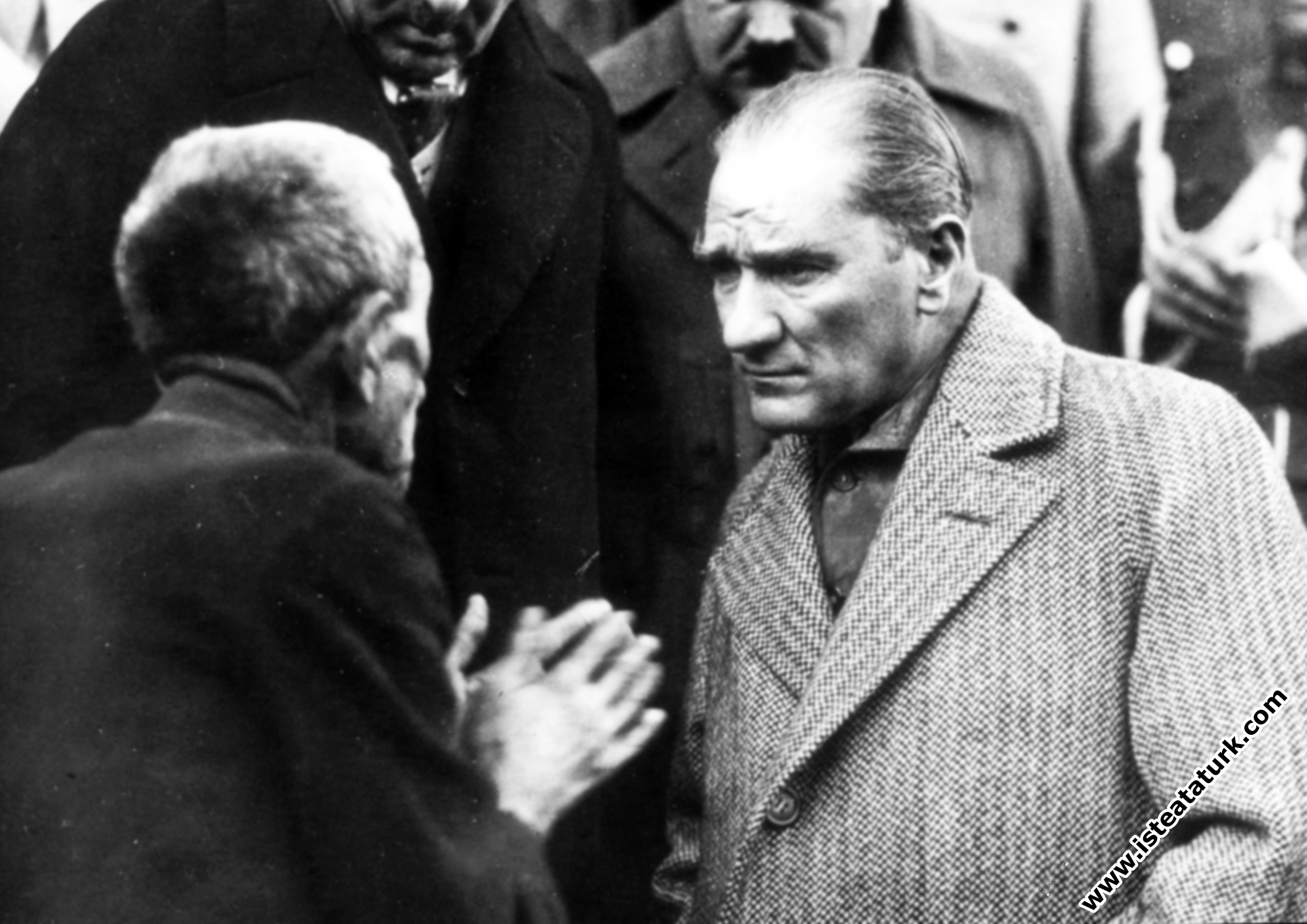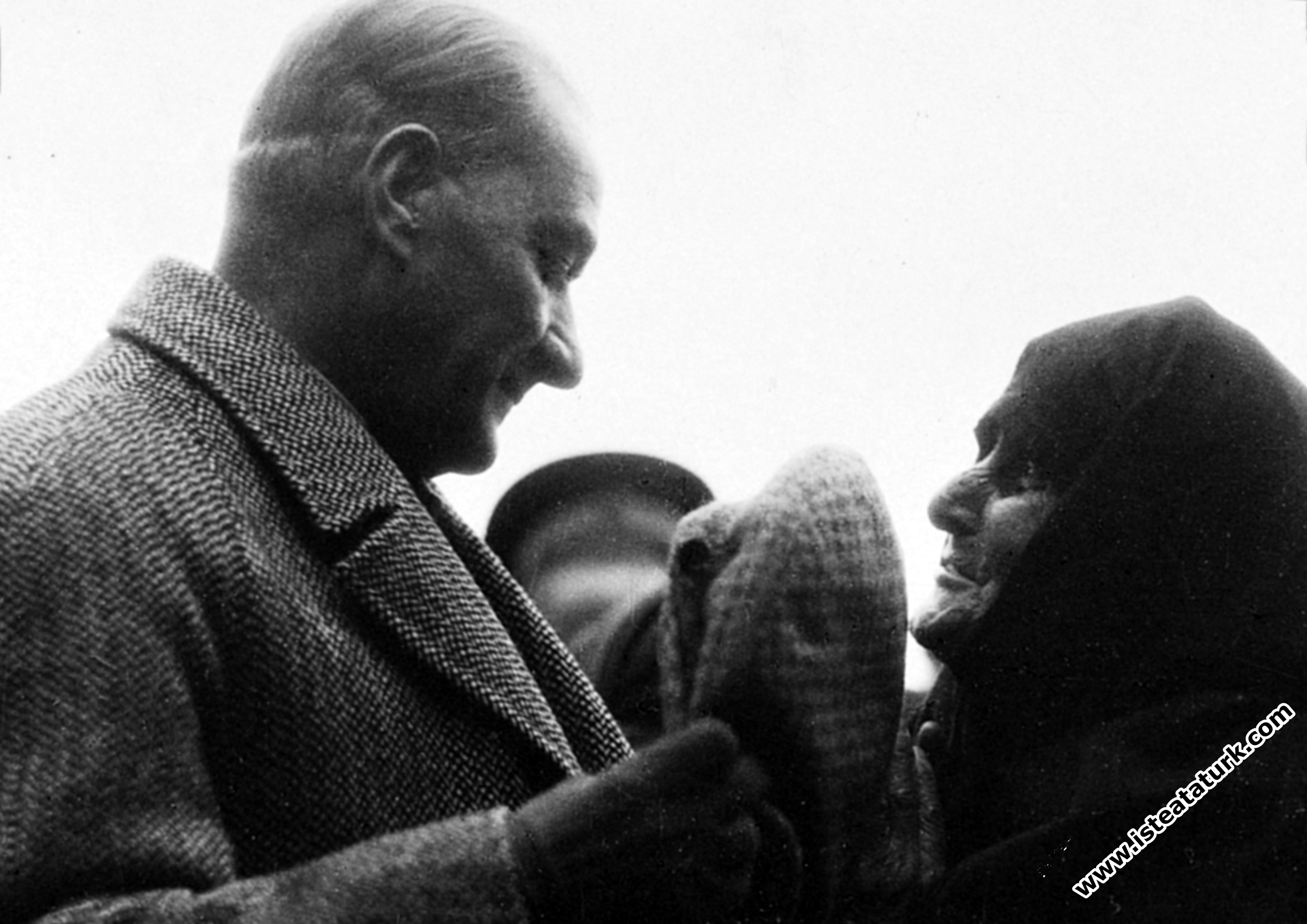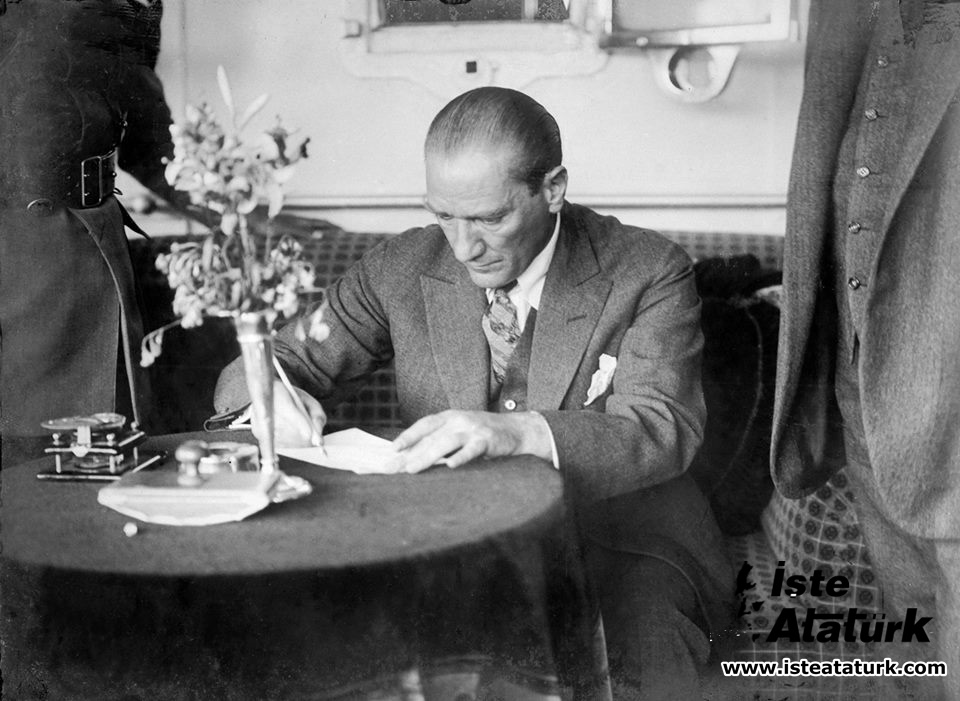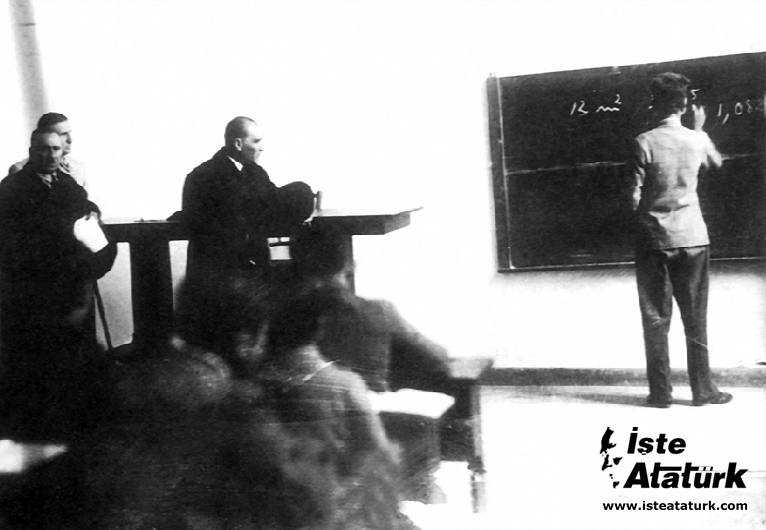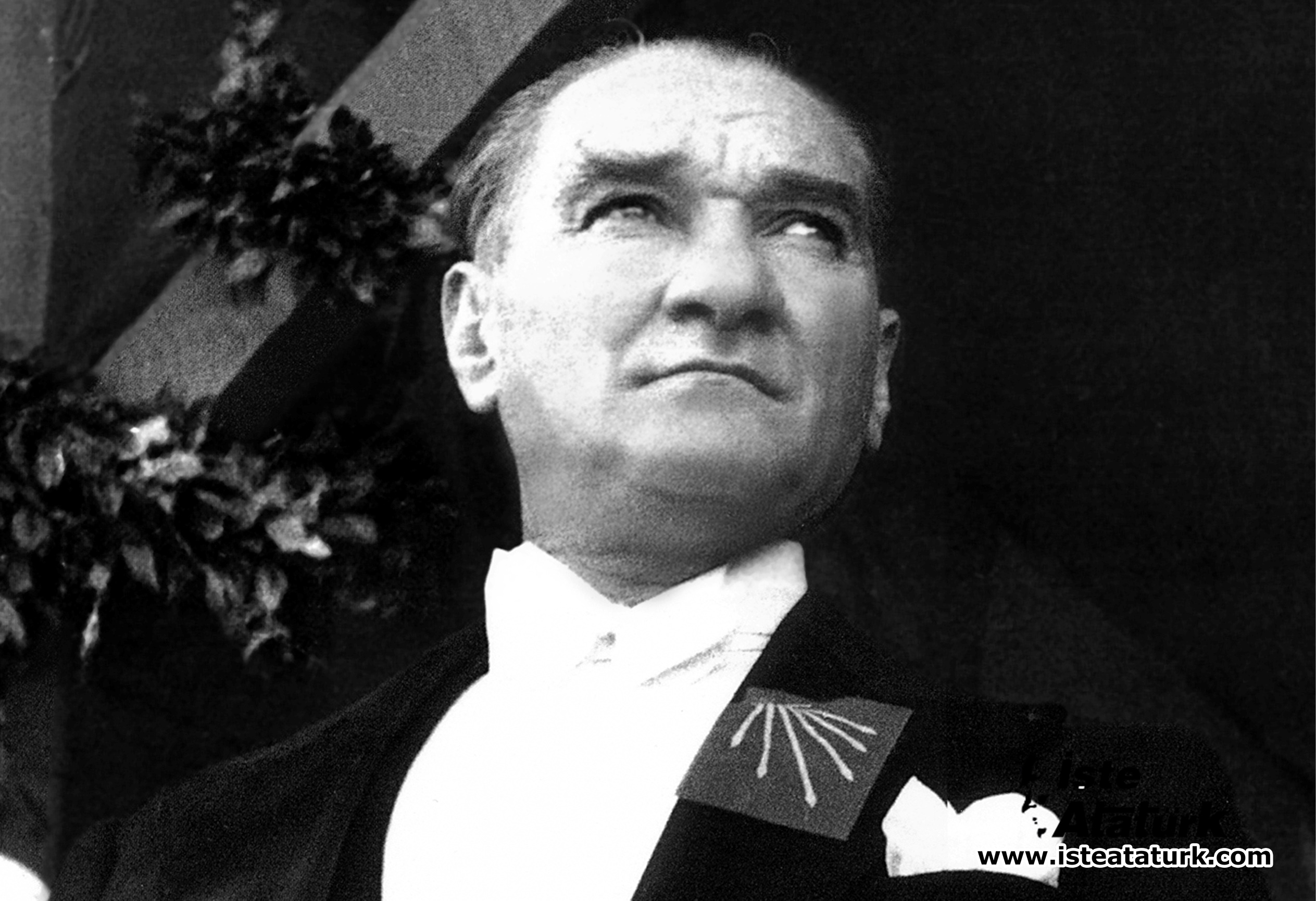
Atatürk's Principles and Other Trends
Character Size
“My fellow citizens, we have done a lot and great things in a short time. The biggest of these works is the REPUBLIC OF TURKEY, whose foundation is Turkish heroism and high Turkish culture.
ATATÜRK'S PRINCIPLES AND OTHER TRENDS
Atatürk lived most of his childhood, youth, education and professional life during the disintegration period of the Ottoman Empire and successfully completed the tasks he had undertaken during this period. Therefore, he knew the administrative, financial, military and foreign policy of the Ottoman Empire closely. He came face to face with the rulers of the world at that time, known as the Düvel-i tremendousa, in different times and grounds along the line from the Tripoli War to the First World War, so he had the opportunity to get to know them. This situation gave him the opportunity to get to know his country and his enemies closely. This should be one of the most important factors affecting its success.
In order to know Atatürk, it is necessary to know him in all phases of his life before, during and after the National Struggle. In addition, the administrative, financial, military and other institutions of the Ottoman Empire in the last century are well known, compared with the institutions of the Republic period, that is, the comparison of Anatolia shared with Sevr and the holy homeland whose borders were drawn in Lausanne, in order to show how the National Struggle was won at the front and at the table. is meaningful. Because, before the National Struggle, minority Greek and Armenian elements in Anatolia monopolized education, industry, trade, crafts and all kinds of resources, and Turkish children were left to defend their homeland at the borders.
The way to know a person should be his actions. If we look at the matter from this point of view, he takes the first place in achieving this ideal as the intellectual and de facto pioneer of the Kuvvay-ı Milliye movement, which the Turkish people started in Anatolia against the Armistice of Mudros and the Treaty of Sèvres. In addition, when the day came, that is, with the thought that it would not be possible to break the invasion and expulsion of the enemy with the Kuvvay-ı Milliye, he succeeded in making the transition to the regular army with the least loss and knew how to disable his closest friends who insisted on the Kuvay-ı Milliye when necessary. He carried out the Great Offensive by assuming all authority and responsibility during the invasion of Western Anatolia and the preparation of the attack on Ankara by the enemy forces, and therefore he had the greatest share in the victory of the final victory.
Following the implementation of the Armistice of Mudros, Atatürk came to Istanbul upon the call he received to return to Istanbul from the Syrian front, where he was assigned. This period gave him the opportunity to make plans for the National Struggle and to open his thoughts to his friends who returned to Istanbul like him from different fronts. Although almost all of the aforementioned comrades participated in the National Struggle movement, it cannot be said that almost all of them shared the same view with Atatürk at first. Although Mustafa Kemal Atatürk shared the idea of national struggle, there were also those who argued that it would not be possible to find soldiers, weapons and money. Mustafa Kemal was successful in finding answers to their questions and convincing them. After he succeeded in crossing to Anatolia as an army inspector, he lit the fire of the National Struggle with the strength he received from his friends.
It is useful to know the principles that ensure the preservation and development of the basic features of the Republic of Turkey, which was established on the ruins of the Ottoman Empire and within the borders determined by the National Pact. These basic features and principles were determined by Mustafa Kemal Atatürk himself as an expression of the truths reached as a result, and after his death, they were named as “Atatürk's Principles”.
In his speech on the occasion of the 10th anniversary of the foundation of the Republic, which we can accept as a masterpiece, Gazi Mustafa Kemal said, “My fellow citizens, we have done many great things in a short time. The biggest of these works is the REPUBLIC OF TURKEY, which is based on Turkish heroism and high Turkish culture”.
In order for the new Turkish state to take its place as an honorable and respected member of the family of nations, the necessary procedures, methods, understanding and principles had to be determined and determined according to the necessities of the time. These principles are not static, they will change depending on the change of time, that is, the differentiation of needs. It is not possible for us to get to know or introduce Atatürk and his principles by taking one of the Atatürk's Principles as a basis or by emphasizing it. Because the principles have an integrative character. In Atatürk's Principles, it is essential to reach the good, the right, the beautiful and the knowledge. “Atatürk's Principles” was guaranteed by an amendment made to the second article of the Constitution on February 5, 1937 in the 1924 Constitution and the said article; He is a statist, secular and revolutionary, his official language is Turkish, his seat is the city of Ankara.
1. REPUBLICITY
It is the first of the basic features of the Republic of Turkey. It is the administration under the administration of an elected president or based on the dominance of the nation, that is, through elected deputies for certain periods. The state of being on the side of the Republic is called "Republicanism" and the person who believes in this is called "Republican".
The national will that appeared in the votes of the people in our time was based on the belief that God had reflected his divine power on a person and equipped him with the divine power of administration. In Historical Turkish States; The Principle of Unity of Powers was kept in force, and weak democracies based on the Principle of Separation of Powers were not complimented.
The form of government in which the head of state is not hereditary or does not continue throughout his life is the Republic. In this administration, the dominance belongs to the whole society, not to a single person or group. The republic is a public administration based on national sovereignty. There are democracies without republics, and there are republics without democracies. The Turkish Republic is not a people's republic based on class rule, nor is it a constitutional and monarchical republic. The Republic of Turkey is a state based on democracy. The Republic of Turkey is based on a lofty idea. In our opinion, the concepts of "Second Republic" and "New Democratic Republic" mean nothing but creating confusion in the minds. In our constitutions, it has been decreed that the republic will not be changed or even proposed to be changed. As a matter of fact, as a result of the Republic, all citizens of the Turkish Republic can take part in the state administration and are responsible for it. In the Amasya Circular, the expression “the nation's determination and will will save the nation from the bad situation it has fallen into” is used. In the Constitution dated January 20, 1921, the definition of the regime was made without mentioning the name of the Republic, by declaring that “the nation has unconditional sovereignty and unconditional sovereignty”. Democracy emerged with the Republic and as a natural consequence of it. According to Atatürk: Republic and democracy are separate from each other. For the Republic should not be just a form: democracy, in turn, is a matter of spirit and understanding. It is necessary to define the republic as a form of state, a form of government. In other words, "it refers to a state in which sovereignty belongs not to a person or group, but to the whole society". Just as there are countries that are not democracies (such as China, Cuba) even though they are republics today. There are also countries (such as England, Belgium, Sweden) that are not republics but democracies. There are also countries where both a republic and a democracy exist, such as Turkey and France.
2. NATIONALISM
Atatürk, the founder of the Republic of Turkey, saw the Turkish nation as a cherished entity. As a result of this, he established the new Turkish State on the basis of the Turkish nation and gave the name of the nation to the state.
Atatürk described the concepts of nation, nationality and nationalism clearly and simply. “The day I landed in Samsun in May 1919, I had no financial strength. There was only a high spiritual force that emerged from the nobility of the Great Turkish Nation and filled my conscience. I started to work by trusting this national force, this Turkish Nation...” Nationalism is a thought and a cultural unity. Its aim is for the Turkish Nation to take its honorable and dignified place among the nations of the world. Because the National Struggle is the result of Turkish nationalism and the determination of the Turkish Nation to live independently. We believe that Atatürk's unifying, aggregating, uplifting, contemporary and civilized understanding of nationalism will be a guide against totalitarian and outdated movements in the future as well as today.
Atatürk's understanding of nationalism is rational, modern, civilized, forward-looking, democratic, collecting, unifying, uplifting, humanitarian and peaceful. This understanding has nothing to do with communism, racism, totalitarian fascism and theocratic order, which are diametrically opposed to nationalism. Turkish nationalism does not deal with the skull, it has nothing to do with superior and inferior theories.
3. PUBLICITY
In the Kemalist thought system, democracy and populism were used as synonyms. The TBM Assembly was formed during the years of the National Struggle and the military, political, economic and administrative decisions taken were passed through the assembly. That is, the struggle was waged on a legitimate basis. The execution of such a war by a parliament is the best expression of Atatürk's view of the issue. The main goal of the Kemalist Thought System is to establish a national, secular, strong and modern state.
Populism: It aims at preserving the balance and solidarity between social groups by not granting privileges to any person or group in state life, rejecting the class struggle, and the state's intervention in socio-economic life. In this respect, populism also meets “Political democracy”. It came to the fore during the National Struggle with the principles of populism, nationalism and national sovereignty. In our opinion, populism is the giving and holding of power, power and dominance directly to the people.
It is synonymous with political democracy in that the people dominate their own destiny. Atatürk lists the Bolshevik Theory, Revolutionary Syndicalism and the Representation of Interests theory among the contemporary political movements that are against democracy, that is, the people. Atatürk did not see these political movements, which are against democracy, suitable for our country. One-party system: It was implemented for a certain period of time in order for Turkey to complete its social and political development.
4. STATISTICS
The Turkish revolution has acted from the fact that a strong state can only survive with a strong economy. Despite the support provided in the first 10-year period (1920-1930), the private sector could not deliver what was expected. Because the conditions were not favorable. During the Lausanne negotiations, the Izmir Economy Congress was held. between 1920-30;
1) Economic development has not reached the desired level.
2) National income is low,
3) Financial resources are insufficient.
4) Change in the demographic structure of the country (22% of the population is non-Muslim... etc.)
5) Lack of trained manpower.
6) Capital issue (Foreign capital - Ottoman Bank)
In 1929, the government intervened in the economy to increase production and get rid of the depression. Etatism does not mean the rejection of the freedom of private enterprise and the market economy. Because one of the basic principles of development is freedom of enterprise. The patronizing attitude in Atatürk's period is not a friendship or hostility to foreign capital, but a national approach that does not allow anyone other than Turkish people to play a role in the fields of profession and business. It is not possible to understand this principle without considering the conditions under which the Republic of Turkey was founded.
5. LÂİKLİK
It is a complete separation of state and religion. This is not an indication that the state is indifferent to religion, but that it remains neutral towards religions.
The phrase “Islam is the official religion of the Republic of Turkey” in Article 2 of the 20 April 1924 Constitution was abolished on 10 April 1928.
When Turkish history is examined, Turkish Islam, that is, the way Turks perceive Islam, is a secular approach (Tuğrul Beğ-Caliph relations).
Secularism is the cornerstone of the Turkish Revolution. The indispensable condition of modernization is that reason and science guide our state and social life with secularism.
The expression “your religion is for you, my religion for me” in our great book, the Qur'an, expresses secularism. Because, according to us, secularism is “the way believers live according to their beliefs”. In Islam, there is no separate and privileged class such as priests and clergy, and there is no privilege of tribe, tribe, tribe or person. It cannot be said that such a privileged class did not exist during the collapse of the Ottoman Empire. In the hands of circles clad in religious guise, religion has been put in a position to hinder development and progress. According to some circles, the blessings of the world are given to non-Muslims. In other words, it has been said that this world belongs to the disbelievers and the next world belongs to the believers.
Religion is necessary in the secular understanding, which is the only guarantee of freedom of religion and conscience. The state must meet this need of its citizens. The place of this information is schools. Leaving this need to communities means that our society, which is completing the process of "nationalization", is re-dividing into groups and communities.
Political bigotry: “A person's views on life and society are absolutely right and others' opinions are wrong”. Secularism does not mean irreligion and no one should try to hide their irreligiousness under the umbrella of secularism. Being irreligious as well as being religious is the freedom of religion and conscience provided by secularism.
This word, which is pronounced as "secular" or "deserving", has passed into our language from French. The original Latin of the word is "Laicus". The terms "Secular" and "Secularism", which were quoted from English and translated into our language, are also used in the sense of secularism. “Laicism”: It is to undertake the defense of secular ideas. “Secularism”: It refers to the understanding of law that is not subject to the rules of religion in social life. As such, it appears as a legal term. In philosophical terms, secularism refers to the acceptance of the dominance of reason instead of belief, and politically, secularism refers to the separation of political power from religious power. In a broad sense, secularism can be defined as "separation of state affairs and religious affairs, and the dominance of reason over religious beliefs in the political, economic and legal order of the state". On the basis of secularism, religion, faith and respect for people, love and tolerance. Secularism is very important for the survival of independence and democracy, which is the regime of freedoms. In this respect, secularism is a matter of life for the Republic of Turkey. Contemporary Turkish people are both sincere Muslims and citizens of the secular Republic of Turkey. In societies based on ignorance, lack of education or half-knowledge, the establishment and adoption of secularism requires time. We are of the opinion that the best results will be achieved by making the efforts of radical movements, which are seen in Islamic countries and sometimes in our country, to unite religion and state a fundamental rule of Islam, that is, by educating our people against anti-secular attitudes. In this respect, secularism is a matter of life for the Republic of Turkey. Contemporary Turkish people are both sincere Muslims and citizens of the secular Republic of Turkey. In societies based on ignorance, lack of education or half-knowledge, the establishment and adoption of secularism requires time. We are of the opinion that the best results will be achieved by making the efforts of radical movements, which are seen in Islamic countries and sometimes in our country, to unite religion and state a fundamental rule of Islam, that is, by educating our people against anti-secular attitudes. In this respect, secularism is a matter of life for the Republic of Turkey. Contemporary Turkish people are both sincere Muslims and citizens of the secular Republic of Turkey. In societies based on ignorance, lack of education or half-knowledge, the establishment and adoption of secularism requires time. We are of the opinion that the best results will be achieved by making the efforts of radical movements, which are seen in Islamic countries and sometimes in our country, to unite religion and state a fundamental rule of Islam, that is, by educating our people against anti-secular attitudes.
6. REVOLUTIONARY
Its lexical meaning is “to turn something, to turn (tourner). As a historical term, it refers to the occurrence of some changes in social and cultural areas in a community. Revolution: It means discord, discord, misery. Although it presents a different concept towards revolution, development and evolution, on the contrary, “revolution” is a concept aimed at disrupting the existing unity and harmony and breaking the order. Both words in terms of usage and meaning in Latin; Revolution: evolution = development, evolution; revolution : revolution = overturning, demolition: revolution : sometimes used together with the word rebellion.
Revolution: This word is used for revolution and revolution. Some circles tried to include Atatürk while forming the idea of ideological revolution preparation by expressing Atatürk's reforms as "Atatürk's revolutions" and spreading the Turkish revolutions as a revolutionary movement, especially among the youth. In other words, they tried to spread the idea that Atatürk was actually a revolutionary, and that it is Kemalism to overthrow the order established by Atatürk with the permanent revolution in which every revolutionist advances on the path of Kemalism. However, the changes that Atatürk made in the social and cultural field are in no way a revolution, but a revolution. In other words, in some institutions that have lost their validity and completed their transfer, development, maturation, modernization activities. Revolutionism consists directly of developmentalism and modernization in Atatürk's thought, language and actions.
Atatürk's reforms are an evolution and a development in the social and cultural life of the nation. Atatürk, regarding the reforms; “These principles we have set are the ones we find useful for the development of our nation on the path of civilization, according to today's necessities. However, the social body is a situation that is always developing and it is imperative that it tends towards evolution. Science and technology are always open to innovations. For this reason, people's wishes and needs develop in an ever-increasing manner in the material and spiritual field. These;
1- Abolition of the Caliphate: (3 March 1924)
2- The Law of Unification of Education: (Unity in Education) With the law dated 3.3.1924 and numbered 429, the Ministry of Seriye and Foundations was abolished and its duties were shared between three organizations.
- Education works = to the Ministry of Education
- Serial affairs = to the Presidency of Religious Affairs
- Evkaf affairs = to the General Directorate of Foundations
3- Closure of Sects, Lodges and Zawiyas (30 November 1925)
4- Women's Right to Vote and to be elected: (October 4, 1926. Turkish woman April 3, 1930 - Mayor). These are taken as examples only.
From the first years of the Republic until his death, Atatürk knew how to identify the wishes and aspirations of the nation on time and in place.
In the timeline from the 19th century to the present, many currents of ideas have been effective in the management of humanity. Among these, the “Atatürk Principles”, which Atatürk put into practice and which, in principle, form the basis for the administration of the State of the Republic of Turkey, continue to exist in a way that meets the needs of people in our age by being modernized. According to us; Kemalist thought is evolutionist, not doctrinal and revolutionary. Mustafa Kemal went down to the sources of the determined truths and made a synthesis. In other words, he has transformed historical accumulations into synthesis. To make an analogy over time, while ideologically nationalist and Marxist people appreciate Atatürk, there is no rightist who appreciates Brezhnev, and no leftist who praises Hitler.
While the Italians punished Mussolini, one of the leading statesmen of the twentieth century, by hanging him upside down on a street lantern, Hitler committed suicide in a bunker and had his body cremated by his relatives.
Stalin destroyed 10 million people for an ideology that did not fit human nature. F. Kastro, who declared that he had made a revolution on behalf of the people, is among the richest people in the world while his people are in misery, and he is in the same position as another dictator, Saddam Hussein.
CONCLUSION :
Ataturk's Principles are the intellectual foundations of the Republic of Turkey. The existence of the Republic of Turkey cannot be explained by one or more of these basic values. It is not possible to define the Republic of Turkey by assuming that one of them is accepted and the others are not. Almost all of the currents that appeared on the stage of history at the beginning of the twentieth century were abandoned within a quarter or half a century. While the intellectual and de facto leaders of these movements were buried in history, the principles laid down and implemented by Atatürk did not lose anything of their essence. Because the great leader Atatürk, based on the cultural values of the Turkish nation, whose existence has been a matter of debate despite being the essential element of a disintegrating state, has started a "Nationization Process" and gave the name of this nation to the new state he founded. HE,
RESOURCES
- ATATÜRK, Mustafa Kemal, Discourses and Statements, C.II, Ankara 1985.
- ATATÜRK, Mustafa Kemal, Speech, Haz. Zeynep Korkmaz, Ankara, 1981.
- BAYKARA, Tuncer, History of Turkish Revolution and Principles of Atatürk, İzmir 1993.
- BIYIKOĞLU, Tevfik, Armistice of Mudros and its Exercise, Turkish War of Independence, C. I, Ankara 1962.
- INAN, Disaster, Civil Information, Ankara 1969.
- The Republic of Turkey and the Turkish Revolution, Ankara 1977.
- KESKİN, Mustafa, Atatürk and Turkey's New Political Structuring, ATASE publication, Ankara 1990.
- TOSUN, Ramazan, History of the Republic of Turkey, Kayseri 1994.
- Atatürkist Thought Handbook, Atatürk Research Center Publication, Ankara 1995.
- YUVALI, Abdulkadir, Turkish Revolution and History of the Republic of Turkey, (Joint Publication), Kayseri 1995.
- KAFESOĞLU, İbrahim-SARAY, Mehmet, Principles of Atatürk and Historical Foundations, Istanbul 1983.
prof. Dr. Abdulkadir Yuvali*
* Member of Atatürk Research Center Scientific Committee
Source: ATATÜRK ARAŞTIRMA MERKEZİ DERGİSİ, Sayı 39, Cilt: XIII, Kasım 1997
NOTE: This conference was given on 7 October 1997 in Ankara for the Public Diplomacy Course.
